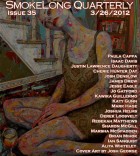Tell us about your inspiration for this story.
History gives me inspiration. It offers fantastic situations that seem somehow similar to our own. When we travel to another country, we gawk at how different everything is, but when we read a history book, we are delighted by the similarities. The writer of historical fiction looks for similarities. As an Asian American writer, we are expected to write stories about our grandfathers in the homeland, or about our parents coming to America. Yet, as an American who has seen the violence perpetrated by our military around the world, I have found inspiration not from my homeland, but with histories of past empires, past “bad guys.” Sometimes I feel that we are like them, that our addiction to the thunder of war will one day come back to us, and when it does, history will be deaf to our own suffering. This is a point of deep anxiety. So it must be written about.
“Reunion” does a beautiful job of humanizing members of two historically vilified (for good reason and otherwise) groups—Nazis and Communists. How difficult was this to achieve in your work? And was this your intention from the start?
A Nobel winning scientist once said that in order to get good people to do evil things, it takes religion. But religions are just ideas, and if ideas, put in very convincing rhetoric, can convince good people to do evil things, simply being good people is not enough. Yet we pride ourselves every day in being good people. Companies donate a cent of every dollar we spend to help us feel this way. So I wanted to write a story about people who, like us, believed they were good, but were slowly realizing their own complicity. For them—Nazis and communists—it was too late. They were already in the hands of madmen like Hitler and Stalin. Rather than vilify these groups, who were driven recklessly into the theater of war, we can learn from them.
The ending also strikes a lovely tenor with that brief, empathic connection between the narrator and the young soldier. One can imagine it as the germ that created this story. Did you begin here or elsewhere? Tell us about your process of revision for this piece.
I wrote the story in one sitting, and the ending emerged as I wrote it. I came into fiction writing as a chatroom role-player, so events in my writing always depend on who the characters have become and what they would do after everything that has happened so far. Like role-playing, flash fiction is more fun if you don’t have an ending planned, if it just emerges from the flow, like an improvised coda. By the time I arrived close to the thousand-word mark, I realized the story had to end this way. It just made sense.
What projects are you currently working on?
I’m trying to publish a speculative fiction novel. Unfortunately, “speculative fiction” still has not become a marketable genre type, so I’ve spent over a year collecting rejection letters from agents and publishers. The restrictive genre conventions of novels are a stark contrast to the still untamed expectations of flash fiction. By demanding so little of a reader’s time, we flash writers are truly free to mess with them. So I’m still writing flash.
Lastly, if I’m not mistaken, Kawika Guillermo is a nom de plume. Can you tell us about your decision to use a pen name? And why this particular one?
“Guillermo” is my mother’s family name, who is third generation Ilocano, and “Kawika” is the name she wanted to give me. The name is also a nod to Winnifred Eaton, the first Asian American fiction writer, who was part Chinese but called herself Onoto Watanna so she could write romances about Japanese geishas. If anyone at the time had thought to translate her name, they would have found “Onoto Watanna” meant something like “to change a name.” She had a sense of humor, and I thought it would be funny to have a name that read “exotic” while writing about things like Nazis.


